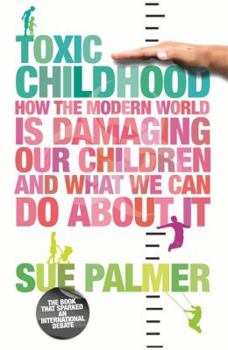Toxic Childhood: How the Modern World Is Damaging Our Children and What We Can Do about It
Select Format
Select Condition 
Book Overview
One in six children in the developed world is diagnosed as having 'developmental or behavioural problems' - this book explains why and shows what can be done about it. Children throughout the... This description may be from another edition of this product.
Format:Paperback
Language:English
ISBN:0752880918
ISBN13:9780752880914
Release Date:May 2007
Publisher:Orion
Length:361 Pages
Weight:0.55 lbs.
Dimensions:0.9" x 5.3" x 7.8"
Customer Reviews
2 ratings
A Good Dose of Common Sense
Published by Thriftbooks.com User , 15 years ago
Sue Palmer is one of the most insightful writers on parenting that I've ever come across. Her advice won't always sit easily with people who aren't prepared to make changes - there's much of our contemporary lifestyle that simply isn't compatible with good parenting, and Sue Palmer doesn't pull her punches. But if you want take action to make life better for you, your child and your community, read this book.
Excellent account of what we need to do for our children's health
Published by Thriftbooks.com User , 17 years ago
Sue Palmer is an experienced writer and broadcaster on children’s education. This very useful book makes a strong case for some traditional values. Our children need to develop focus, self-restraint and empathy; they need to learn to do as you would be done by; and they need presence, not presents, parents who listen and talk to their children. She recommends real food, less of sugar’s empty calories and more fish oil, eaten at family meals; play and exercise; bedtime routines; and protecting children from advertising (Sweden bans advertising to under-12s). In Finland, a teacher of nursery children must have a master’s degree. Britain, on the cheap, uses poorly-qualified, even unqualified, staff, not just in nurseries but increasingly in primary and secondary education too. Our children from age five are subjected to tests and targets: our 11-year-olds are bottom of the league for enjoying reading. In Sweden and Finland, formal education starts at seven: they are top for literacy and have smaller gaps between rich and poor and between boys and girls. But it is not just a matter of deficient parenting skills, or of a defective educational system. Why do these happen? Our competitive, long-hours, rat-race, culture is harming our children – and our adults too! When both parents have to be out working to make ends meet, the whole family suffers. As Ms Palmer says, we need family-friendly economies, not economy-friendly families. And there is the vital matter of inequality, which, unfortunately, she does not treat in this book. Britain has the third biggest gap between haves and have-nots among the 24 OECD countries; the USA has the biggest. We have the second highest child death rate; the USA has the highest. The others in the bottom six - New Zealand, Australia, Ireland and Canada - also have the ‘Anglo-Saxon’ model of unfettered free markets. Researchers from Dundee University recently pointed out, "There is a very strong association between income inequality and under-five mortality among the wealthier OECD countries. Within this group the highest child mortality figures are to be found in those ‘Anglo-American’ countries which attracted criticism in 1993 in a Unicef study on child neglect. Since 1960, the relative ranking, based on increasing under-five mortality, of these countries has markedly worsened relative to the others." [David Collison et al, ‘Income inequality and child mortality in wealthy nations’, Journal of Public Health, published online 13 March.] In 1993, we were 15th, we are now joint 22nd. This decline happened equally under Conservative and Labour governments. Perhaps our whole social model is wrong. Perhaps we should stop looking to the USA’s failed social model. We do need to change things and as she writes, "Nobody ever changed anything by sitting around bemoaning the status quo."





